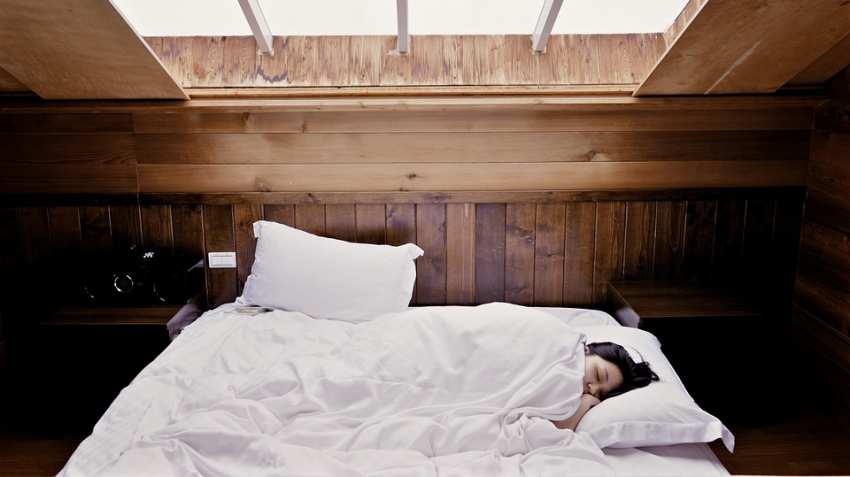Temperature
Your sleep can be significantly impacted by draughty, cold and hot rooms. During the evening is when your body temperature peaks. The lowest levels of body temperature are then achieved once you start sleeping. The temperature that’s cool enough and ideal for the bedroom is thought to be around 16-18°C (60-65°F). Restlessness can be witnessed when temperatures rise over 24°C (71°F). You may also experience difficulty sleeping when trying to drop off in a cold room. Low temperatures of about 12°C (53°F) will cause difficulties when trying to catch sleep.
A slightly warmer environment may be needed for the elderly and the young. It is important to invest in a thermometer to monitor room temperatures. A variety of different bedding can come in handy for different seasons. During cold seasons, you’ll get more comfortable with an extra blanket or layer of sheets. Bed socks or a hot water bottle can help with your cold feet during such times. Indoor Outdoor Thermometers could help you to track normal temperature. There are many different thermometers, we recommend that you check this review.
For the circulation of cool air, leave windows open where possible during the hot months. Don’t leave open any downstairs windows. This keeps out any intruders leaving you safe. You can open upstairs windows that are in a locked setting.
Lighting
Ever asked yourself why the best nights of sleep happens in the dark? This is because our bodies carry the assumption that lights mean waking up. Melatonin is released in darkness. This hormone helps us drift off by promoting the body’s relaxation. No wonder many of us have a hard time during British Summer Time while trying to adjust to a new pattern of sleep.
Consider going for an eye mask or blackout blinds if you hate waking up to the early morning sun. Get a dimer light if you fancy reading while in bed. Additionally, you can buy an alarm clock that features light settings. Such a clock dims as you head into the night helping you to sleep and gradually brightens towards dawn. Computer screens and mobile phones are the biggest culprits that may keep you awake. Melatonin is suppressed by the blue light that glows from these LED displays.
Comfort
For a great sleep at night, the most important element is your bed. With an uncomfortable and old bed, it may be quite impossible for you to get a deep night’s sleep. You may wake up achy and tired from sleeping on mattresses that lack support, space, and comfort. Your partner’s sleep will also be significantly affected. Find the best mattress for side sleepers. You can also check the trusted review sites like MyBestMattress for more details about mattresses like those best mattress brands or top mattresses in the market today.
We are all made differently. This explains why different beds are suited for different bodies. Go for the perfect mattress that is ideal for your weight and build. It should also offer the correct support. Find a mutually comfortable bed if you are going to be sharing it with someone. A good posture should be maintained while we sleep. We slouch due to sleeping on a mattress that’s too soft. Pressure’s exerted on our shoulders and hips by a mattress that’s too firm. Visit the National Bed Federation to find out more about how to choose a bed.
Gadgets & Gizmos
Relaxation, resting, and intimacy are there only roles for our bedrooms. Regrettably, our bedrooms are somewhat an extension of our living rooms. The introduction of digital distractions has made it to our bedrooms. There’s no harm in playing games, responding to emails or watching a movie. These tasks, however, need not be completed in the bed.
Technological toys shouldn’t be in your bedroom. Treat this place as your haven. Let there be peace within your bedroom. This creates a calm and relaxing space. We have trouble falling asleep by having TVs, tablets, phones, and computers in our bedrooms. They’re disruptive. The circadian rhythm of the body can be severely affected by any buzzes, beeps and the tiniest of lights. Ensure you switch off everything while in bed. Alternatively, just don’t go with them to bed.
Noise
Needless to say, sleep can definitely be interrupted by sudden, loud or repetitive noises. Double glazing is an effective way to deal with this problem. It dampens sounds from outside. You can also go for foam earplugs. They can come in handy during warmer months. You can leave your windows open during such months.
Soft and steady sounds, on the other hand, can be soothing during sleep. ‘White noise’ tapes have been discovered to help some people during sleep. Other people have been found to have a preference for low familiar tones. (such as Wayne Rooney, I mean, who likes dozing off to the sound of a hairdryer or vacuum cleaner!)
